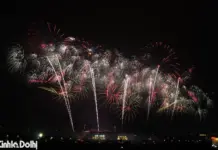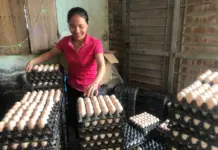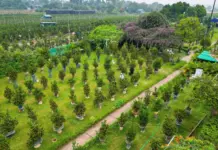Dr. Tran Huu Son, former Deputy Chairman of the Vietnam Folk Art and Literature Association, will talk about the preservation of Vietnamese culture through Tet activities.
Reporter: What does the Lunar New Year mean to the Vietnamese culturally?
Dr. Tran Huu Son: Tet, Vietnam’s traditional Lunar New Year embraces many cultural meanings. It is the pinnacle of the Vietnamese culture. That’s why we need to preserve it, promote it, and keep Tet a real festival of the Vietnamese people.
Reporter: Why is Tet considered a national heritage?
Dr. Tran Huu Son: Heritage is the quintessence left by ancestors for later generations. Food, for example. The rest of the year, you can eat whatever you want. But during Tet, it’s necessary to select the best dishes of each region. Some regions prepare six dishes, others have 12 dishes to offer the ancestors at Tet. All Tet dishes are cultural symbols.
All Tet rituals and other customs including prayers to ancestors embody cultural identity. Tet paintings and ornamental fish and trees comprise the art of Tet like the shapes of sticky rice cakes: square in the north and cylindrical in the south. The preferred colors during Tet are hot colors: red and yellow, which create brilliance and are believed to bring in good luck.
Reporter: You said Tet has lots of cultural meaning. What are some examples?
Dr. Tran Huu Son: Getting-together makes Vietnamese Tet special. Tet is a time for family reunions, when all family members, regardless of where they are, do their best to come home by the last day of the lunar year. It is also a time for meeting with friends and neighbors, and for expressing gratitude to the ancestors and gods. On the evening of the last day of the 12th lunar month, or several days before that, many families visit their ancestors graves and invite them back home to enjoy Tet with the family. This get-together makes Tet cozier and families and communities more united. This is the foundation of patriotism and national unity.
Reporter: Lunar New Year is a Vietnamese national heritage. How important is preserving this heritage?
Dr. Tran Huu Son: The preservation of Tet is of special importance because it is the source of national unity. Before uniting the nation, it is necessary to unite families and communities. Tet is a time to link the living and the dead, the living and the gods. No matter where Vietnamese people go, they always feel their ancestors are accompanying and helping them.
Reporter: Spiritually, Tet has a special meaning to Vietnamese people. But today’s Tet is much different from Tet in the past. What do you think about the changes?
Dr. Tran Huu Son: I agree there have been changes in the conception and celebration of Tet. What is relevant to our current lifestyle, society will gradually accept. But in recent years, I realize that many residential areas are trying to restore the cozy atmosphere of traditional Tet, like wrapping chung cakes together or jointly buying a pig for Tet. Even in the Industry 4.0 era, people still want to meet face-to-face when Tet comes.
Reporter: Traditional Lunar New Year remains special to Vietnamese people. Which factors are the most important in preserving Tet?
Dr. Tran Huu Son: Tet is very important, but it is not at all easy to preserve it and the culture it represents. Although Tet celebration seems to be changing, no matter how it changes, Tet reunions will remain the same. Many people now prefer to travel during Tet, but on the afternoon of the last day of the last lunar month, they still reunite with their families and wait to begin their trip on the next day, the first day of the New Year.
In the past, people used to conclude the Tet holiday on the 4th or the 5th day by seeing off the ancestors. Now that can take place on in the evening of the first lunar day, but the point is the seeing-off ritual signaling the end of Tet, still exists.
Today, if people live or work far from home and can’t come back for Tet, they can use modern technology to get together virtually. This means the space of Tet has been expanded. It is no longer limited to physical, geographical space. It has become a much larger social space.
Reporter: Thank you Dr. Tran Huu Son for your story about Tet now and then and how it means to Vietnamese people.




